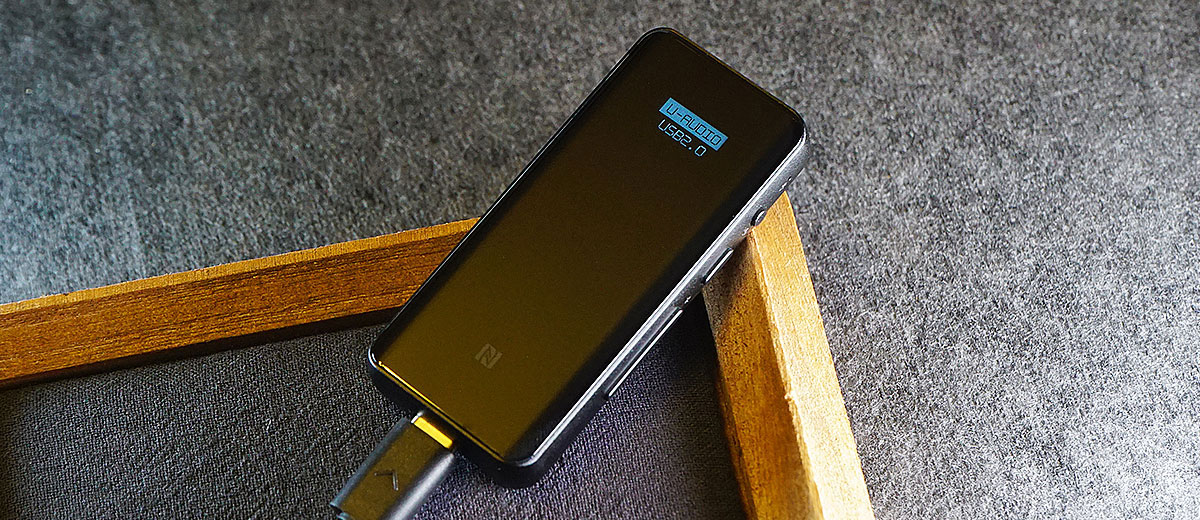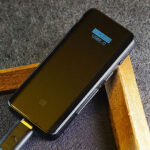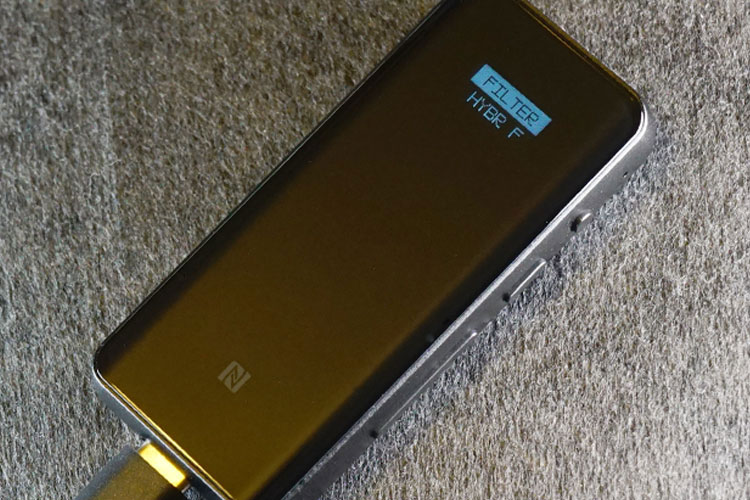FiiO BTR5 2021 is a 2nd gen wireless Bluetooth receiver dongle featuring a dual ESS ES9219C DAC and MQA unfolding. It is priced at $119.99
Disclaimer: This was sent to us as a sample for our honest opinion. Headfonics is an independent website with no affiliate links or services. We thank FiiO for this opportunity.
To learn more about the FiiO products we have previously highlighted on Headfonics you can click here.
Note, that this post follows our latest scoring guidelines which you can read up on here.
The original BTR5, FiiO’s TOTL Bluetooth dongle has been a community favorite since its release in early 2020.
One and a half years later FiiO rolled out a revamped iteration for this feature-packed device, with dual ESS ES9219C upgrades plus the capability to deliver MQA, (Master Quality Authenticated) decoding via USB connection.
Most of the specs are inherited from the original BTR5 though FiiO claims that the performance should be superior to the first edition with no change in the price which is a nice bonus.
Tech Highlights
There’s a long feature list identical to the original BTR5 but now you also get additional MQA rendering as well as an upgrade in the DAC chipset to a Dual ESS ES9219C from the previous ESS ES9218P.
Aside from the new DAC upgrade the BTR5 2021 also uses an FPGA-coded clock management system powered by dual oscillators and an XMOS XUF208 USB chipset, supporting up to DSD256 decoding when used as a USB-DAC.
For wireless, the BTR5 2021 offers Bluetooth 5.0 and NFC, (near-field connection) embedded for touch connection. You also have access to a smart APP control panel to tweak the behavior of the dongle or to change digital filters on the unit directly.
The CSR8675 controller does not give the best range or save power quite like the latest Qualcomm solutions, though it is very stable and manages to give 9 hours of listening time on a 1.5-hour charge. From the experience using the original BTR5, it doesn’t seem like a bad idea to keep some of the functional designs and brush up on the performance side.
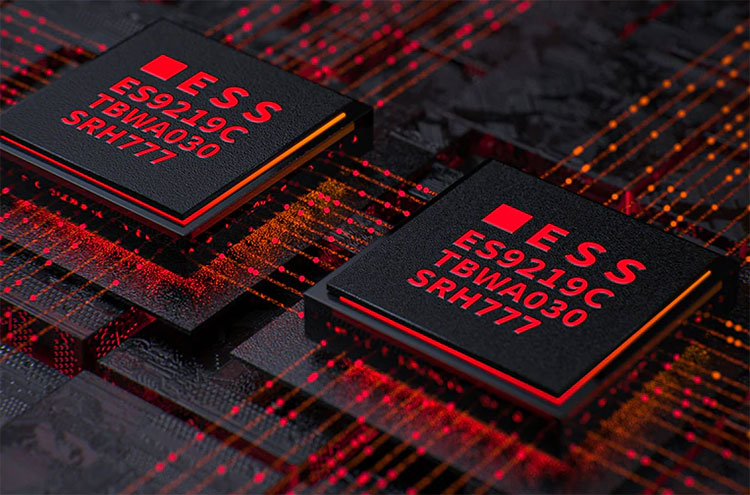
Internal Hardware
DAC & Amp
The BTR5 2021 uses a dual ES9219C DAC updated from the original ES9218P on the BTR5. This enhances the decoding ability with better SNR performance while keeping the power management optimal.
On paper, the measurements of BTR5 2021 come quite close to some entry to mid-tier DAPs but are identical to the original BTR5, being able to output a max 240mW @32ohm load in a balanced configuration. The Signal to Noise ratio is measured at 122dB, close to the human ears threshold, and is reflected by the good extension in the output.
Codec Support
Starting off with Bluetooth 5.0 support, the BTR5 2021 can handle AAC up to LDAC at a max of 24BIT/96kHz. The Qualcomm CSR8675 solution onboard also supports 120MHz digital signal processing. When you connect to USB sources it can support up to 384kHz files and native DSD256 decoding.
On a side note, while equalizing works really well on AptX, on an LDAC connection there is no native EQ support but you can tweak the EQ options on your player app before it pumps out the signal.
MQA Support
The BTR5 2021 supports 16x MQA unfolding and the screen will show “MQA” when MQA is working. Connecting to the phone with the supplied USB-C cable and firing up Tidal, the device gets into MQA mode quite swiftly with no hiccups.
The decoding quality is on the same level as lossless files on the phone. Sometimes I find MQA files being mastered more tastefully than some of my original recordings, so even if it is lossy, you might get the same if not better enjoyment compared to a Redbook WAV.
FPGA Clock Management
The FPGA on BTR5 2021 is all about digital clock control, which was once a TOTL DAP feature but now more popular on top-tier dongles. Such custom-coded chipsets are responsible for Bluetooth and USB digital signal processing and clock management, enhancing the accuracy of the signal processed and reducing jitter.
The topology has the FPGA chips paired with dual crystal oscillators operating at 45.1584M/49.152M, which are implemented for different sampling rates.
The audio signal is filtered to reduce jitter, so you can feel good control of the output with low noise performance. From FiiO’s data, the playback quality with the LDAC codec reaches local playback quality similar to DAPs.
Design
The BTR5 2021 has an incredibly slim and futuristic design embedding curved panels on a screw-less metallic chassis. It has the perfect form factor for everyday carry and it is so sleek and light that it almost feels weightless in the pocket.
The aluminum middle frame is well-machined and sandblasted to feel very smooth to the touch. The aesthetics are awesome without any redundant features sticking out. The screen can be clearly read under sunlight and the buttons have clean clicks that are very responsive to the touch.
The metallic casing seems to shield the device from EMF interference nicely while ensuring a very stable connection. Even on a crowded train it does not lag or drop the connection even once.
Screen
The retro-looking screen on the BTR5 2021 is the same unit used inside the original BTR5, similar to the Lotoo PAW S1. This is a 0.49-inch OLED screen with a 64×32-pixel real estate that shows all the info you will need.
This includes pairing status, battery level, codecs being used, volume, and call status. You can shift through options such as the charging status, car mode, and its onboard filters with no delay detected when navigating through the menu.
Battery life
The BTR5 2021 takes only 1.5 hours to fully charge its 500mAh and you will get 9 hours max on paper with playback on a 3.5mm output. The original BTR5, with Redbook WAV files, gave around 5-6 hours of playback before the battery drained out on 2.5mm output so the performance is similar given both have the same battery capacity.
I/O
On the top panel of the device, you will find the analog outputs including a 3.5mm TRS unbalanced and 2.5mm balanced socket. Please note that if you plug in both 3.5mm and 2.5mm at the same time you will only get output from the 3.5mm side.
When you connect to USB devices the BTR5 2021 will prompt you to turn on the “USB Audio Adaptor” mode which turns off charging and establishes a USB connection for decoding once you press any button to enter the function. You could even connect to the Nintendo Switch as well as the PS5 now using a USB connection.
Controls
The controls set of the BTR5 2021 is fairly intuitive with the added feature that it can double as a handy portable remote during audio playback.
Turning to the right side there are 3 buttons and a microphone that will pick up the voice when you use it for hands-free calls. Between the power button and volume control, you can find a multifunction button that will trigger playback functions, call-taking, and voice assistant.
The BTR5 2021 supports memorized volume control with 60 fine steps in USB mode and 32 steps on Bluetooth connection. You don’t need to worry about a sudden jump in volume and adjust every single time from low volume and can allow fine adjustment when using sensitive IEMs like the Shure SE846, Campfire Audio’s Andromeda, or even custom IEMs.
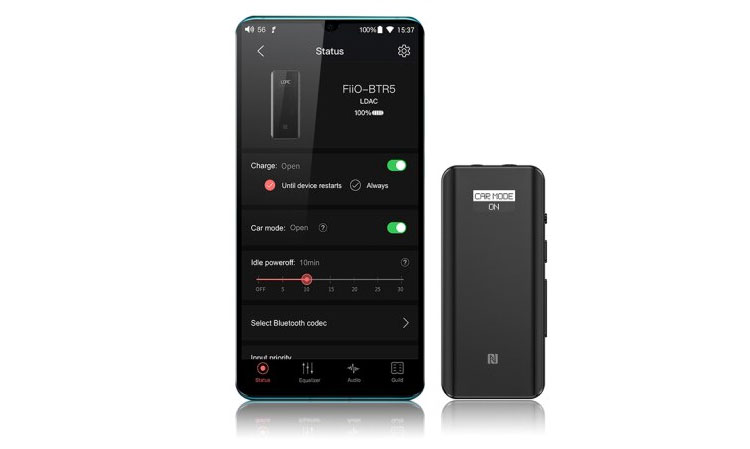
FiiO Music App
Pairing with the FiiO music app you will be able to configure channel balance, switch between filters, and access the 10-band equalizer. This is a very handy feature while other app users could also access the onboard filter menu on BTR5.
You may notice the tweakable filters powered by the 120MHz DSP on CSR8675 being reduced from 6 to 2 options. FiiO explained that this is due to the addition of its MQA decoding feature.
In practical terms, it doesn’t affect the experience much since I am sticking to the default setting that sounds the most natural to my ears, despite the fact that the equalizers aren’t usable when the BTR 2021 is decoding MQA.
Microphone
Built into the BTR5 2021 are two omnidirectional microphones with cVc8.0 noise reduction technologies. The BTR5 2021 will switch to the in-line microphone when you plug in a 3.5mm CTIA standard earphones with a mic.
However, if you plug in an earphone under the OMTP standard which has the mic/ground pin inverted, the mic control may not be supported.
NFC Connection
If your Phone has NFC functionality then pairing is lightning fast, simply turn on NFC on your phone and you can tap the dongle on the back of the phone for instant connection.
In fact, this is one great functionality that boosts the user experience and it is not offered on many competing devices.
Packaging & Accessories
The BTR5 2021’s packaging has been revamped from the BTR5’s rather plain design, with cooler sci-fi-themed graphics on the cover. Inside, you will find accessories including a plastic drawer that can be used to store other audio parts.
Digging in you will find a transparent hard case that is pretty rugged from my experience with BTR5. Along with the hard case, you also get a USB-C to USB-A cable for charging, a USB-C to USB-C OTG cable, a warranty card, and a quick start guide.
The USB-C OTG cable was not supplied in the original BTR5 packaging so this time it is much more friendly if you want to use the BTR5 2021 with your USB-C devices. The cable is extremely soft but thick enough to feel durable. You can easily secure it on the back of your device with some double tape.
Click on page 2 below for sound impressions and select comparisons

